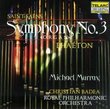| All Artists: Popov, Karapetian, Ussr State So Title: Popov: Symphonic Suite No.1/Symphony No.5 in A Major, Op. 77, "Pastoral' Members Wishing: 2 Total Copies: 0 Label: Olympia Release Date: 6/24/1997 Genre: Classical Style: Symphonies Number of Discs: 1 SwapaCD Credits: 1 UPCs: 515524005986, 723723084224, 5015524405984 |
Search - Popov, Karapetian, Ussr State So :: Popov: Symphonic Suite No.1/Symphony No.5 in A Major, Op. 77, "Pastoral'
 | Popov, Karapetian, Ussr State So Popov: Symphonic Suite No.1/Symphony No.5 in A Major, Op. 77, "Pastoral' Genre: Classical
|
CD DetailsSimilar CDsSimilarly Requested CDs |
CD ReviewsAbsolutely Inspiring, David A. Hollingsworth | Washington, DC USA | 03/26/1999 (5 out of 5 stars) "Add a serving spoon of Ravel, Debussy, Roussel, &Respighi, a table spoon of Rimsky-Korsakov, a tea spoon of Richard Strauss, & a pinch of Glazunov's "The Sea" & Puccini. All these deligious & interesting ingredients will make up the essence of Gavriil Nikolayevich Popov's symphony no V in A major of 1956 cast in five movements.Notwithstanding the above mentioned ingredients, the Symphony is pervasively French in tone. Although the work is entitled "Pastoral", this is a work of peace, poetry, struggle, anger, optimism & hope, & finally peace. It is a personal musical essay of the composer who was recovering from the infamous Zhadonov attack on leading Soviet composers in 1948. Popov was not able, as a result of the attack, to regain the fame & stature he was abled to achieve after the 1920s (thanks largely to his Chamber Symphony of 1926).In the end, the symphony is beautiful, inspiring, & troubled, ending in hope and quiet optimism. Olympic CD (OCD 598)did Popov a great deal of justice in issuing this work in a CD format (& other works on other Olympia reissues). This symphony is coupled very handsomely with the Symphonic Suite no. 1 extracted from music to the film "Komsomol is the Chief of Electrification" (this is one of 38 films Popov has written music for, a standard honoured by major soviet composers during the Soviet Era). The suite is colorful & descriptive, related to the frantic, dark, energetic Symphony no. 1 (related in turn to Shostakovich 4th Symphony portraying the horrors of the Soviet Regime & of Stalinism). The performances were energetic, exciting, & absolutely passionate. The recording, although slightly raw, is however more than tolerable.I will say "highly recommended" until I'll lose my voice & strength." A Recording Worth Finding! Grady Harp | Los Angeles, CA United States | 05/26/2007 (4 out of 5 stars) "Though listed as 'currently unavailable' this recording is indeed available if the music fan is persistent. And as this is the sole recording of Gavriel Nikolayevich Popov's 'Symphonic Suite No.1, Op. 14 from the music score to the film 'Komsomol: Patron of Electrification' written in 1933, the search is well worth the effort. Popov (1904-72) was one of the composers who fell victim to the demands imposed by Stalin during the scourge that flattened the artist life in the USSR. Though he bowed to the demands of the government, he did continue to write numerous film scores and symphonies, all of which are somewhat musically retrogressive - and also quite beautiful.
The true star of this recording (remastered in 1997 with performances by conductors Edvard Chivzhel and Gurgen Karapetian at the helm of both the Moscow Radio & Television Symphony Orchestra and the USSR Symphony Orchestra) is the Symphonic Suite No.1. It is a relatively brief work (18 minutes) that opens with an other-worldly 'Largo cantabile' which is scored for full orchestra with added theramin and soprano and tenor soloists (wordless vocal lines): the effect is breathtakingly beautiful. The remainder of the suite movements are marked 'Grave', 'Intermezzo', 'Valse', and 'Fugato'. In each of the movements the orchestral color and rhythms are richly colored with adept orchestration. The Valse has as much humor and satire as the Grave section has pathos, and the closing Fugato is ecstatic. The recorded performance is fine but the work needs to be recorded under current standards. At a recent Los Angeles Philharmonic North American premiere performance of the work Esa-Pekka Salonen took advantage of the acoustic brilliance of Disney Hall and the result was revelatory! This is strangely rewarding little unknown work. The accompanying work is Popov's 1956 Symphony No.5, here performed by the USSR Symphony Orchestra with full tonalities if a bit too aggressive in sound for the composer's concept of a 'pastoral symphony'. The movements are designated 'Pastorale', 'Storm', 'Struggle', 'Hopes', and, again, 'Pastorale'. This is not a great work of the 20th century but one that deserves far more attention in this country than it has achieved. But the real reason to search for this recording is the Symphonic Suite No.1, a true treasure of the repertoire. Grady Harp, May 07" |

 Track Listings (5) - Disc #1
Track Listings (5) - Disc #1
